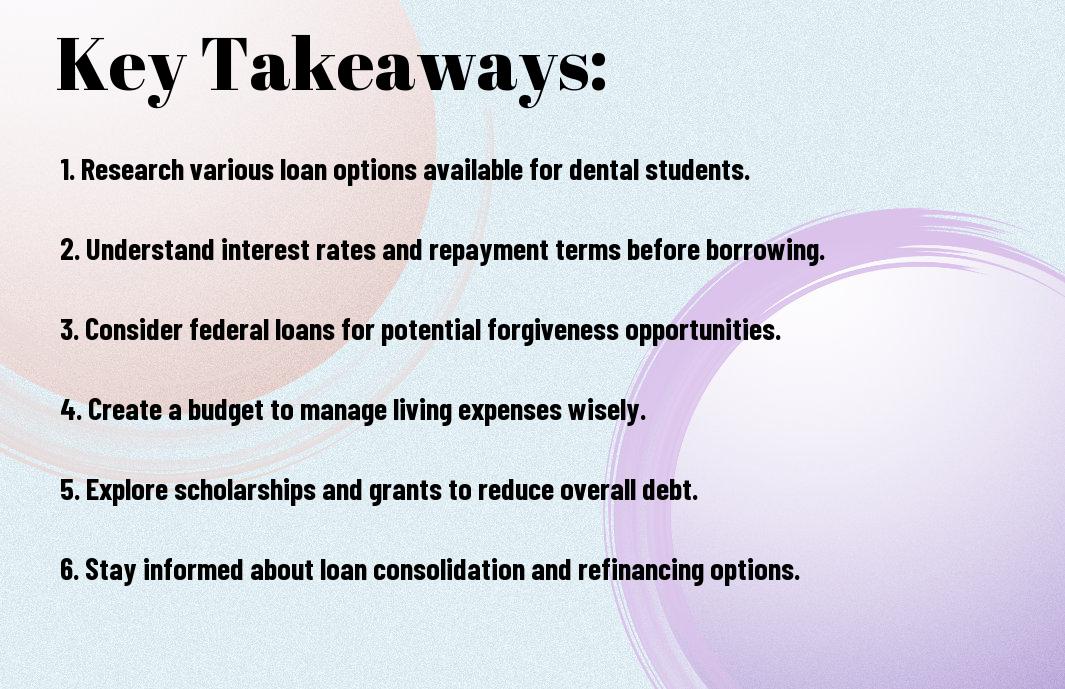Understanding Dental Student Loans – Financing Your Education For A Successful Career
Many dental students face the challenge of financing their education, which can often lead to significant debt. Understanding the different types of dental student loans available is imperative for managing your expenses effectively and ensuring you make informed decisions. By learning about federal loans, private financing options, and potential scholarships, you can better navigate your financial responsibilities. This information will not only help you achieve your educational goals but also set you up for a successful career in dentistry without the burden of overwhelming debt.
Key Takeaways:
- Types of Loans: Familiarize yourself with different types of dental student loans, including federal and private options, to find the best fit for your financial needs.
- Loan Terms: Understand the various terms and conditions associated with each loan, such as interest rates, repayment plans, and grace periods, to avoid surprises later on.
- Financial Aid Resources: Explore scholarships, grants, and work-study opportunities that can supplement your funding and reduce overall debt.
- Repayment Strategies: Plan ahead for repayment by considering income-driven repayment plans and loan forgiveness programs tailored for dental professionals.
- Budgeting: Create a detailed budget to manage your expenses while in dental school, ensuring that you minimize the amount you need to borrow.

Overview of Dental Student Loans
A dental education is a significant investment, and understanding your options for financing is vital. Dental student loans are designed to cover tuition, fees, and living expenses while you pursue your degree. They can vary greatly in terms of interest rates, repayment options, and eligibility requirements. Familiarizing yourself with the different types of loans available can help ensure you make informed financial decisions for your future career.
Types of Loans Available
- Federal Direct Loans
- Federal Grad PLUS Loans
- Private Loans
- Institutional Loans
- Income-Share Agreements
Assume that you explore each type of loan thoroughly to determine which one best fits your financial situation and career goals.
Federal vs. Private Loans
Among the two main categories of dental student loans, federal and private loans, you will find significant differences in terms of benefits and features. Federal loans often offer lower interest rates and more flexible repayment options, whereas private loans may require a credit check and tend to have variable interest rates. Additionally, federal loans provide programs for loan forgiveness and income-driven repayment plans, which can be beneficial depending on your financial situation following graduation.
Also, it’s important to evaluate your long-term financial strategy when choosing between federal and private loans. Federal loans have fixed interest rates and may offer deferment options during residency, meaning less immediate financial strain. Conversely, private loans could pose a greater risk due to variable interest rates and often lack repayment flexibility. Assess your individual circumstances to ensure you select the best loan option that can support your career without overwhelming your financial future.

Interest Rates and Repayment Options
Some aspects of dental student loans can significantly impact your financial future, particularly interest rates and repayment options. Understanding these factors not only aids in budgeting but also helps you choose the right loan products to align with your career goals. Being well-informed can lead you to a more manageable financial path as you transition from student to practicing dentist.
Understanding Interest Rates
On your journey to financing dental school, comprehending interest rates is vital. Interest rates can vary greatly depending on the type of loan you obtain, whether federal or private. These rates ultimately determine how much your loans will cost over time, affecting your monthly payments and total debt burden.
Repayment Plans
At this stage, you’ll want to explore the variety of repayment plans available for your dental student loans. Many lenders offer flexible plans enabling you to adjust payments according to your financial situation post-graduation. Options like income-driven repayment plans can help ease the financial burden by linking your monthly payment to your income.
In fact, choosing the right repayment option can significantly enhance your financial well-being. For example, with income-driven repayment plans, your payments may be lower during the initial years of your practice, allowing you to focus on building your career without overwhelming financial stress. It is important to thoroughly investigate all available options, as some plans may even offer forgiveness programs after a certain number of qualifying payments, reducing your total debt load. Taking the time to evaluate each plan ensures that you align your financial strategy with your personal and professional goals.
Loan Forgiveness Programs
Unlike traditional repayment plans, loan forgiveness programs offer you a path to alleviate your student debt by eliminating a portion or all of your loans after you fulfill certain requirements. These programs are particularly beneficial for dental school graduates who choose to work in underserved areas or in specific public service capacities. As you begin on your rewarding career, understanding these options can provide significant financial relief.
Eligibility Criteria
At the outset, you need to determine your eligibility for loan forgiveness programs, which often includes requirements such as working in a qualifying practice, maintaining a good payment history, and committing to a specific time frame in service. Programs may vary significantly in their stipulations, so it’s crucial to explore which program aligns with your career goals.
Application Process
Before you can benefit from loan forgiveness, you must navigate the application process, which typically involves submitting documentation of your employment, detailing your service, and confirming your loan status. This process might seem daunting, but being organized and aware of the necessary steps can facilitate a smoother application experience.
Further, completing the application for loan forgiveness requires you to gather important documents such as proof of employment, tax returns, and loan statements. Additionally, timely submission of these documents, along with any required forms, can make a significant difference in your eligibility. Pay close attention to deadlines and ensure your information is accurate, as errors can delay processing and potentially hinder your chances of forgiveness. Engaging with a financial advisor specializing in student loans may also provide valuable insights to help you successfully navigate this process.

Budgeting for Dental School
After deciding to pursue a career in dentistry, it’s imperative to create a realistic budget that encompasses all your financial needs. This budget should take into account not only your tuition and fees but also living expenses, textbooks, and materials. By understanding your financial landscape, you can mitigate stress and focus on excelling in your studies.
Estimating Costs
Before you begin on your dental school journey, it’s vital to thoroughly estimate all associated costs. Consider tuition fees, textbooks, equipment, and daily living expenses, as well as any potential income loss if you’re attending school full-time. Understanding these figures will enable you to better prepare for your financial commitments.
Financial Planning Tips
Estimating your costs is just the start; effective financial planning will help you navigate dental school obligations.
- Keep track of your expenses to ensure you stay within budget.
- Seek out scholarships and grants to reduce student debt.
- Consider part-time work or internships for additional income.
Perceiving your financial situation clearly will empower you to make informed decisions that support your educational goals.
It’s imperative to develop a comprehensive financial plan that aligns with your budget and future aspirations. Track each expense diligently while maintaining an eye for any unexpected costs that might arise throughout the semester. Explore various scholarship opportunities, and don’t hesitate to apply for additional financial aid. Establish a savings plan for emergencies, ensuring you’re prepared for anything unexpected. You’ll also want to explore ways to finance your education without accruing overwhelming debt. Perceiving your financial health holistically will significantly enhance your dental school experience.
Scholarships and Grants
Many dental students seek financial assistance through scholarships and grants to alleviate the burden of educational expenses. These funding opportunities can significantly reduce the amount you need to borrow, allowing you to focus more on your studies and less on your financial situation. Exploring various options can lead to discovering resources that match your qualifications and aspirations, paving the way for a smoother financial journey to your dental career.
Finding Opportunities
About many organizations, including dental associations, universities, and private entities, offer scholarships and grants specifically for dental students. Conducting thorough research online and networking with peers can help you uncover these valuable resources. Additionally, frequenting scholarship databases and your school’s financial aid office can provide you with extensive lists of available financial opportunities tailored for aspiring dental professionals.
Application Strategies
Application strategies are vital in securing scholarships and grants for your dental education. You should focus on presenting yourself authentically and demonstrating your passion for dentistry effectively through your applications. Researching scholarship requirements and tailoring your essays to reflect your unique experiences and goals will enhance your chances of success.
This process involves crafting compelling personal statements that highlight your motivations, achievements, and community involvement. Pay attention to specific eligibility criteria and highlight your strengths in both your application and interviews. It’s imperative to submit all documents accurately and on time to avoid losing out on funding. By dedicating time and effort to these application strategies, you can significantly increase your chances of winning scholarship awards that will positively impact your financial outlook as you pursue your dental education.
Impact of Student Loans on Career Choices
Despite the allure of a rewarding dental career, student loans can significantly influence your choices post-graduation. The need to manage large debt balances may lead you to select higher-paying specialties or positions that may not align with your personal interests or values. As you navigate your career path, understanding how your financial obligations can dictate your professional decisions is crucial for achieving a fulfilling and sustainable practice.
Debt-to-Income Ratio
Student loans directly affect your debt-to-income ratio, which is a key factor lenders evaluate when you seek financing for a home or practice. This ratio compares your total monthly debt payments to your gross monthly income, influencing your financial health. A higher ratio may limit your options, making it vital to manage your student loans wisely to maintain flexibility in your future career and lifestyle.
Specialties and Their Financial Implications
Around the dental field, various specialties come with different financial implications linked to anticipated income, educational costs, and loan repayments. Choosing a specialty requires weighing the potential earnings against the time and money spent in additional post-graduate training.
Implications of selecting a specialty based on financial factors can be significant. While orthodontics and oral and maxillofacial surgery often offer higher compensation, they also entail extended educational commitments and increased debt. Conversely, general dentistry may provide a more balanced lifestyle with less financial burden, but the income potential is usually lower. Ultimately, aligning your specialty choice with both passion and financial feasibility is vital for your long-term success and satisfaction in the dental profession.
Final Words
On the whole, understanding dental student loans is key to effectively financing your education and paving the way for a successful career in dentistry. By exploring various loan options, managing your finances wisely, and planning your repayment strategy, you empower yourself to tackle future challenges confidently. Make informed decisions to ensure that your educational investment yields the desired outcomes for your career. With the right knowledge, you can navigate the complexities of student loans and focus on achieving your professional goals.
FAQ
Q: What types of dental student loans are available?
A: There are primarily two types of dental student loans: federal loans and private loans. Federal loans, such as Direct Unsubsidized Loans and Grad PLUS Loans, are offered by the government and generally have lower interest rates and more flexible repayment options. Private loans, offered by banks or other financial institutions, can cover the remaining costs but usually require a credit check and may have higher interest rates.
Q: How do I apply for federal dental student loans?
A: To apply for federal dental student loans, you need to complete the Free Application for Federal Student Aid (FAFSA) form. This application determines your eligibility for federal aid, including grants, work-study, and loans based on your financial need. The FAFSA is usually available starting in October for the upcoming academic year.
Q: What is the average cost of dental school, and how much should I expect to borrow?
A: The average cost of dental school can vary significantly depending on the institution, but it generally ranges from $20,000 to over $70,000 per year for tuition alone. Including living expenses, books, and other fees, total costs can exceed $300,000 for some programs. It’s common for dental students to borrow amounts equal to or greater than their program’s total cost.
Q: What are the interest rates for dental student loans?
A: Interest rates for dental student loans can vary widely. As of the most recent data, federal Direct Unsubsidized Loans have fixed interest rates typically set annually by Congress, while Grad PLUS Loans have slightly higher fixed rates. Private loans often have variable or fixed rates, usually influenced by the borrower’s credit score and the lender’s policies. It’s important to compare options to find the best available rates.
Q: Are there any forgiveness programs for dental student loans?
A: Yes, there are a few loan forgiveness programs available for dental students. Options like the National Health Service Corps (NHSC) and state-specific programs may offer loan repayment assistance in exchange for service in underserved areas. Additionally, Public Service Loan Forgiveness (PSLF) can be available for those working in government or non-profit sectors after meeting specific criteria.
Q: How can I manage my dental student loans effectively once I graduate?
A: Managing dental student loans effectively requires creating a financial plan. Start by understanding your total debt and loan types. Consider options such as income-driven repayment plans that adjust your monthly payments based on your earnings. Make timely payments and consider making extra payments towards principal when possible to reduce overall interest costs. Additionally, explore refinancing options down the line if you secure a good job to lower your interest rates.
Q: What are the implications of defaulting on dental student loans?
A: Defaulting on dental student loans can have serious consequences, such as damage to your credit score, wage garnishment, and loss of eligibility for additional federal financial aid. Additionally, your loan balance may increase significantly due to penalties and fees. It is imperative to stay in communication with your loan servicer if you’re struggling to make payments to explore alternative repayment options and avoid default.






